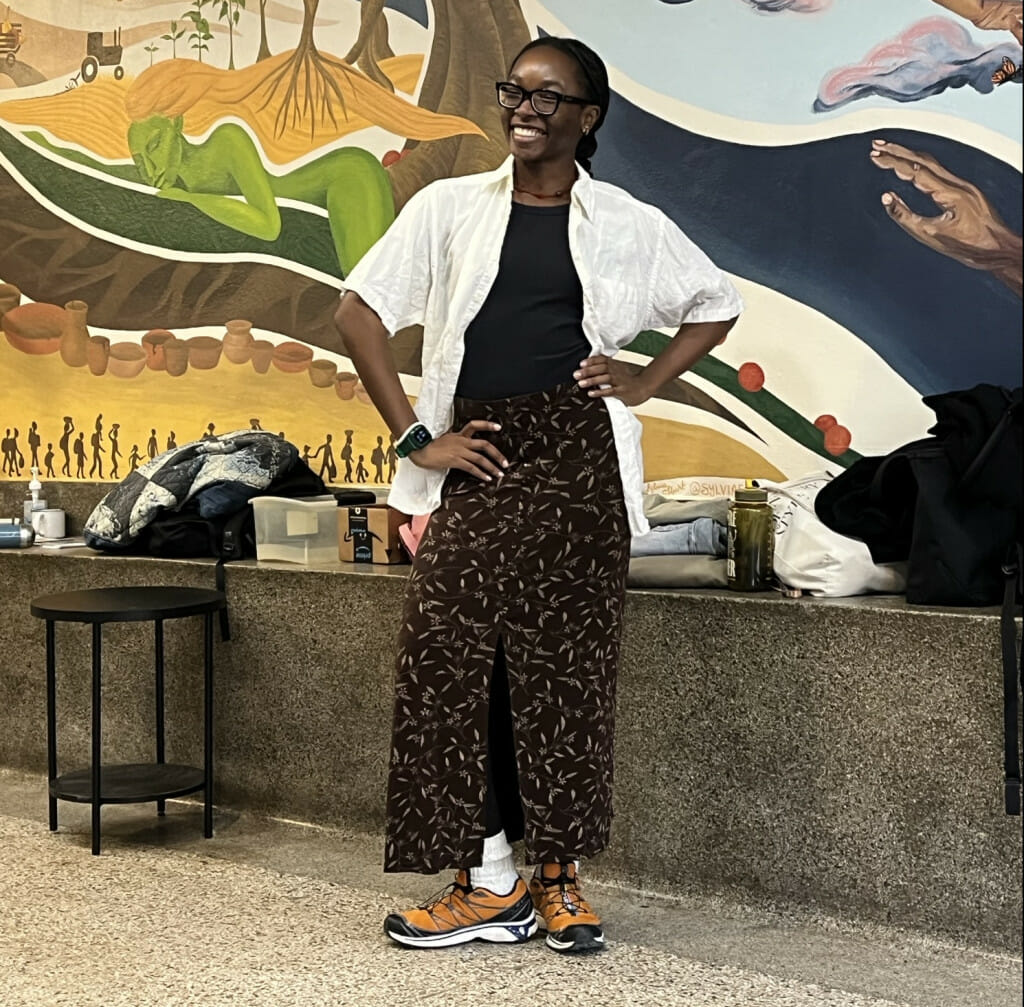Re-Wear It: Teaching sustainable fashion practices one clothing swap at a time

Ashley-Grace Dureke helps lead mending and upcycling workshops as part of the organization’s programming.
Ashley-Grace Dureke has always had a passion for clothing and thrifting.
When she was younger, her mom taught her how to sew by hand so that she could make clothes for her American Girl doll. Over time, she learned how to crochet, knit and mend her clothes.
Now, as the president of Re-Wear It at UW–Madison, Dureke is teaching students and campus community members about sustainable fashion practices.
“At Re-Wear It, our main goal is to educate about conscious consumerism and to make it more accessible to the average college student,” Dureke said.
Initially starting as a pandemic project, RWI has since evolved into a student organization with biweekly clothing swaps and sustainable fashion workshops. The next RWI clothing swap is from 1 to 4 p.m. Friday at 221 North Park St., Room 1108, and it’s part of UW–Madison’s Earth Week activities.
RWI also calculates their impact through water saved, waste diverted, and money saved. Through clothing swaps, RWI has saved over $10,000 and diverted over 1,000 pounds of waste.
The organization was initially founded by Yvette Sanchez, another UW–Madison student who wanted to create a space for sustainable fashion and education space on campus.
Dureke was inspired to join because of her love of thrifting.
“I’ve been thrifty my whole life,” Dureke said.
Dureke helps lead mending and upcycling workshops as part of the organization’s programming. She teaches students how to make their clothes last longer or convert them into other things when they’re no longer wearable.
“We turn old t-shirts into rags for cleaning…[or] crochet plastic bags into a durable bag for grocery shopping,” Dureke said.
While the workshops are relatively new, Dureke noted that she hopes to dedicate more time to education and hands-on activities.
“Especially now, trends are propelled by social media, so they run through fast. So, people think, ‘I need this’ and then only wear it once and throw it away.”Ashley-Grace Dureke
“[The workshops] are still [about] encouraging people to have fun while being conscious and sustainable,” Dureke said.
In addition to these workshops, Dureke hopes to educate about the impact of fast fashion and the role social media plays in propelling these trends.
“Especially now, trends are propelled by social media, so they run through fast,” Dureke said, “So, people think, ‘I need this’ and then only wear it once and throw it away.”
Before joining RWI, Dureke occasionally fell into this. She then adopted a new mindset that allowed her to be more thoughtful and sustainable while purchasing new clothing.
“I’ve learned only to buy something if I’ve thought about it for more than two months, because then I know I’d wear it for that two-month period,” Dureke said.
Ultimately, Dureke said, your style is personal to you. “Yes, I’m influenced by the internet, but there are some things that are so uniquely mine that I’ve only attained because I’ve sought it out in the most sustainable way possible.”
For Dureke, being a part of RWI helps make college a more sustainable place.
“College can be a very wasteful place sometimes, for example, when people move out and throw out a bunch of good furniture or clothes,” Dureke said.
In creating a space on campus for students to recycle and reuse clothing, Dureke hopes to encourage students to be more thoughtful and intentional about their fashion choices.
“It calls back to personal style and being there to give clothing back to people who can enjoy it for its entire life,” Dureke said, “I think Re-Wear It has filled a gap and made free thrifting and [sustainability] more available to students.”
Find out more about Re-Wear it here.




